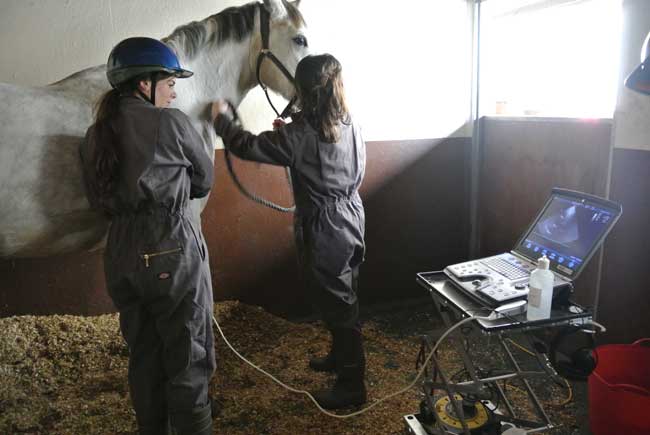At the end of January I travelled down to Nottingham for the third annual Student Equine Veterinary Association (SEVA) symposium.

The weekend was crammed with lectures, practicals and seminars relevant to horses in particular, for equine enthusiasts from all UK vet schools – and even some from further afield.
Auspicious start
Any congregation of vet students is eventful, and the weekend kicked off with us accidentally setting the toaster on fire before making our way to campus for the first set of lectures.
It’s always interesting to see other vet schools in their settings: the short journey through the Midlands countryside was quite different from our commute in the West End of Glasgow.
Sarcoid legend
Big names in the equine vet world were present to deliver talks on a range of subjects from the emergency colic, orthopaedics, the racing vet and reproduction.
The British weather was against some of the guest speakers and, after battling the snow to make his plane, Prof Derek Knottenbelt arrived a little later than planned to deliver his lecture on oncology – a highly amusing and informative presentation that proved the renowned sarcoid legend was worth the wait.
Jonathon Pycock, as well as delivering a talk on reproduction, ran a seminar on the Veterinary Defence Society (VDS) and through the medium of hilarious anecdotes, encouraged students to make use of the VDS in the future should they ever get into a sticky legal situation.
Practicals covered a wide range of subjects, but I had chosen cardiology and farriery.
Matters of the heart
The cardiology practical covered auscultation of the normal horse and localisation of a heart murmur in the abnormal horse, followed by ultrasound scanning of the heart; something I’d never done before.
We were able to use electronic stethoscopes during the session – the difference they made was incredible (shame I haven’t got a spare £400 to upgrade from the manual one). We then had a related seminar on diagnosing and interpreting heart murmurs from auscultation recordings and ultrasound videos, which was very helpful in trying to distinguish heart sounds more clearly.

Local Army Farriers ran a session on farriery, allowing us to practice removing a shoe, putting a shoe on and the approach to an abscess in the foot. We later discussed the use of different remedial shoes for various conditions and urged us to communicate effectively with farriers in order to work together to achieve the best solution to problems of the foot.
Party on
Saturday evening played host to a black tie ball, with great food and wine and a live string band, before continuing the party with many of the speakers also dancing among the students until the early hours.
As with all vet events, I had a fantastic time and would urge other students to go to at least one of these symposiums or congress during their time at vet school.
Even if it’s revision, I find learning something you think you might know reasonably well in a different format will highlight areas you need to work on and help consolidate things better. While the focus is primarily academic, I think these weekends are still always true to the vet school mantra of “work hard, play hard”, and I always have a fab time.


